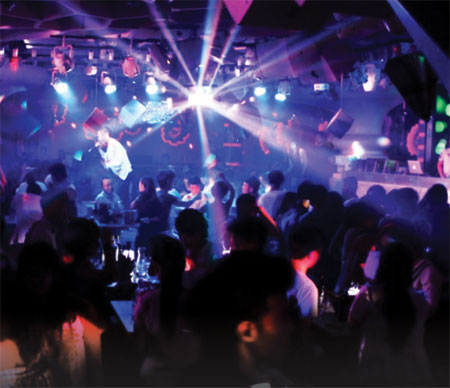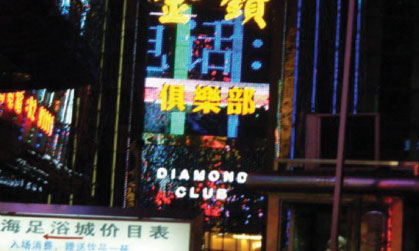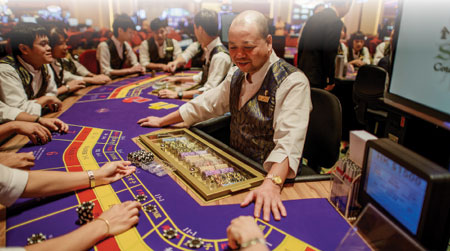Living on the mean streets
Updated: 2012-12-29 07:55
By Sl Luo(HK Edition)
|
|||||||||
|
Hong Kong triads are mostly involved in running and supervision of entertainment outlets such as nightclubs, bars, karaoke lounges and sauna houses that are much frequented by Hong Kong people in affluent mainland cities of Shenzhen, Dongguan and Huizhou. Provided to China Daily |
|
Hong Kong gangs have seemingly found greener pastures and a much safer haven across the border, as long as they know how to play the game. Provided to China Daily |
Triad-related violence in the SAR itself has not diminished despite a concerted crackdown and increased cooperation between Hong Kong and mainland law enforcers. Sl Luo reports.
Hong Kong businessman WC Yip spent a fortune in the past five years, taking a crack at a venture that wasn't really his thing, but he was determined to cash in on the mainland's economic boom.
He jumped on the bandwagon and went solo, investing in a sprawling portside farm on the outskirts of Chaozhou city in eastern Guangdong province, breeding oysters for the lucrative Hong Kong and mainland markets.
Business flourished and Yip had even planned to float his company, both in Hong Kong and on the mainland, mapping out future plans for expansion. But his dream was to be shattered.
By late 2010, he was teetering on the brink of financial ruin after a gang of hooligans ransacked the farm and smashed it up for reasons only known to the perpetrators. The daring raid was carried out in broad daylight and witnessed by Yip's staff, as the workers cowered in terror.
In the days following the attack, Yip claimed to have received numerous threats and warned never ever to go back again.
He suspects it was the work of triads, colluding with corrupt real-estate developers, out to evict him from the site to make way for new projects in the mainland's red-hot property market.
"I've no enemies. I don't even know who did it. But now I'm almost bankrupt and I've exhausted all avenues trying to seek justice," Yip told China Daily.
The businessman, who is also a British citizen, approached the British consulates in Hong Kong and Guangzhou for help and protection, claiming his life was in danger, but to no avail.
Providing security for Yip is not on the consulates' agenda, let alone stepping in to help resolve the dispute. The businessman was bluntly told that if he felt his life had been threatened, he should approach mainland police for help.
"The consulate told me there's nothing much they can do, and that it's not their policy to intervene in commercial disputes. They asked a lot of weird questions such as what type of travel documents I would normally use to commute between Hong Kong and the mainland. It's absurd.
"Being a British passport holder is no big deal. The big question is that I've been using only a home return permit most of the time in commuting between Hong Kong and the mainland. So, I was told, getting the mainland or Hong Kong authorities to help would be more logical," laments Yip.
His last resort was to take legal action against the Chaozhou city authorities, claiming hundreds of millions of yuan in compensation. The case is still pending with no settlement in sight.
Such is the predicament facing Hong Kong merchants doing business or investing in projects on the mainland, with the growing influence of triads adding to their woes, on top of convoluted red tape and rampant corruption, particularly when starting new businesses.
The triad menace on the mainland is not an overnight issue - it has been there for ages, but Hong Kong gangs have seemingly found greener pastures and a much safer haven across the border, as long as they know how to play the game, as a retired, veteran Hong Kong crime buster puts it.
"Local triads pushing north has somewhat intensified in recent years in the face of a continued police crackdown on organized crime," says the former officer surnamed Lam, who had served in the Hong Kong police force for more than three decades and has accumulated a vast pool of knowledge with regard to the nature, organization and operations of triads.
"In Hong Kong, it's a case of saturation, combined with skyrocketing rents for commercial establishments in the prime red-light districts, such as Mong Kok and even in the remote Tsuen Wan and Yuen Long areas, where gangs are especially active and tend to draw most of their revenues. This has hit them hard in their pockets," he says.
"Secondly, Guangdong province, due to its close proximity to Hong Kong, is increasingly being used as a back-up base for triads on illicit operations such as drugs storage, counterfeiting and the production of fake credit cards. They would consider themselves only extremely unlucky if they got busted by mainland law enforcement agencies."
According to the officer, triad members still hold their regular meetings, recruitment rituals and gatherings in Hong Kong to plot their sinful operations. On the mainland, the Public Security Bureau doesn't really know a lot about these "foreigners" unless they're tipped off by their Hong Kong counterparts.
The huge daily human traffic flow between Hong Kong and the mainland makes it difficult for mainland law enforcers to keep a tab on active triad members on the mainland and to gather vital intelligence.
"The triads do have a much safer compound there compared with Hong Kong's tight environment," Lam says.
According to police estimates, there are some 3,000 active Hong Kong triad members operating on the mainland, particularly Guangdong province. But, at the same time, there has been no noticeable decline in triad-related activities in Hong Kong itself despite a continued police crackdown.
The groups include Hong Kong's biggest triads, the Sun Yee On, 14K and Wo Shing Wo, which are said to be active in the more affluent cities of Shenzhen, Dongguan and Huizhou.
They're mostly involved in the running and supervision of entertainment outlets like nightclubs, bars, karaoke lounges and sauna houses that are much frequented by Hong Kong people.
"While engaged in their illicit businesses, which are operated on a fairly wide scale, these people know the rules, how to play the game in a 'foreign' land and would not go all out to create suspicion and retaliation or invite police action, unless they're cornered by their rivals," says Lam.
Guangdong, nevertheless, has been rocked by a series of high-profile, triad-related incidents in recent years.
In mid-2007, Yeung Ka-on - a popular former Hong Kong television artiste - was jailed for life for his role in the execution-style murder of a Hong Kong businessman, who was shot dead while having breakfast in Luk Yu Teahouse, one of Hong Kong's most famous tea joints in Central.
The gunman who carried out the killing was sentenced to death and executed, while six other men allegedly with Hong Kong triad connections were given lengthy prison terms.
In 2011, a senior Hong Kong triad boss was shot and seriously wounded in Dongguan, reportedly the culmination of deep-rooted rivalry between two opposing factions within the Sun Yee On. According to reports, hired assassins are known for their ruthlessness, destined to kill to fully accomplish a mission. The victim only managed to save himself by collapsing and feigning death before being rescued and transported back to Hong Kong for treatment.
A notorious case occurred in Shenzhen three years ago when police arrested a gunman allegedly plotting to shoot Martin Lee Chu-ming, founding chairman of Hong Kong's Democratic Party, and Jimmy Lai Chee-ying, the owner of Hong Kong's Chinese-language Apple Daily and Next Magazine.
Shenzhen police claim to have done serious work to stop the triads in their tracks.
Earlier this year, they rounded up more than 40 hard-core members of the Sun Yee On in the city's infamous Shajing district and charged them with various offenses ranging from murder to kidnapping and bribery.
The Shajing faction - a unit of the Hong Kong triad - is said to be the largest triad ever busted by Shenzhen police.
The faction's political connections were so deep that it reportedly extended to the district's former Party chief, who admitted to accepting more than HK$12 million from the triad group in exchange for his services and cooperation.
Hong Kong triads have also spread their tentacles to Macao where they are known to be actively involved in the management of VIP rooms at casinos.
The active triad groups are the 14K and splinter factions of the Wo group - Wo Shing Wo, Wo On Lok and Wo Shing Yee. The Wo group, with an estimated 20,000 members, is said to be the longest-established triad society in Hong Kong.
Their principal income derives from junket operations, recruiting high-rollers from the mainland and loan-sharking. "These triads were originally from Hong Kong, but have become independent in themselves, running establishments without any sort of supervision from Hong Kong triad groups," says Lam.
Macao's proximity to the bustling city of Zhuhai, just across the border, provides the gangs with another valuable back-up base like Shenzhen, to which they can "abscond" in case of simmering trouble in Macao.
Adding to the worries of Macao's residents has been the recent release from prison of the notorious reputed leader of the 14K group, "Broken Tooth" Wan Kwok-koi, who served 15 years behind bars for gang related activities committed during the chaotic pre-handover days in Macao.
Wan was reportedly told by the city's authorities days before his release to "behave" and warned that his movements would be kept under tight scrutiny.
Some 14 people were killed in the bloody run-up to the handover, as rival gangs stepped up efforts to eliminate each other for turf control.
But, Lam does not believe that sort of carnage would ever return to the city.
"Macao's political, security and judicial systems are much more mature and organized now compared with the pre-handover days under the Portuguese. The Security Bureau currently oversees everything, and the central government, for sure, will not tolerate and allow it - gangs, violence, corruption," Lam says.
Effective law enforcement is key to deterring crime, but getting rid of triads once and for all is an almost impossible task, he says.
"Triads can only be operated against. They can never be eliminated. It's like a poisonous fungus. After you've plucked it, it grows back again.
"The other factor is that triad businesses are lucrative enough. If you take one of them down, another guy takes over and starts it all over again. It's too tempting as far as rewards are concerned," Lam says.
|
Employees on training at a casino in Macao. Hong Kong triads have also spread their tentacles to Macao, where they are known to be actively involved in the management of VIP rooms at casinos. Macao's proximity to the bustling city of Zhuhai provides the gangs with another valuable back-up base. Philippe Lopez / AFP |
(HK Edition 12/29/2012 page4)


